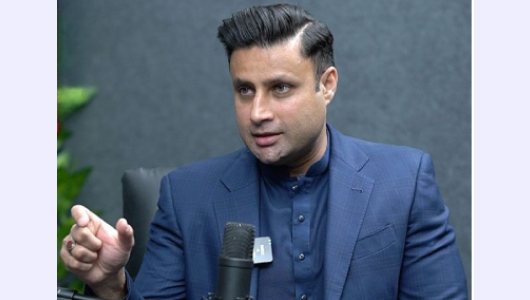LONDON: Sayed Zulfi Bukhari, a close associate of Pakistan Tehreek-e-Insaf (PTI) Chairman Imran Khan, expressed at the SOAS University of London during a discussion on “Democracy in Crisis” that nominating Usman Buzdar as chief minister of Punjab was a misstep by the party.
He mentioned that although the former prime minister realized this error early on, replacing Buzdar posed challenges due to internal party dynamics.
Speaking candidly for over two hours, Bukhari acknowledged the PTI’s misjudgments during their nearly four-year tenure and engaged in a critical dialogue with students. He revealed that Imran Khan retrospectively acknowledged Buzdar’s inadequacy for the role, but various factions within the Punjab PTI created political complexities hindering his replacement.
Bukhari highlighted the existence of influential groups like the Aleem Khan faction, clarifying that removing Buzdar could have ignited internal strife within PTI. He supported Khan’s decision to retain Buzdar to prevent such internal discord, despite Buzdar’s ineffective performance as Punjab’s chief minister.
Regarding Farah Gogi, a close associate of Bushra Bibi, Bukhari distanced himself and the PTI from her. He suggested that if the alleged corruption allegations against Gogi were substantiated, she should face legal consequences. When questioned about Khan’s defense of Gogi in the media, Bukhari stated that Khan was unaware of Gogi’s affairs, asserting that it wasn’t his responsibility to investigate her.
Furthermore, Bukhari condemned the May 9 attacks on military installations and emphasized the PTI’s consistent stance against violence. He acknowledged the party’s past mistakes during its governance and expressed a willingness to rectify those errors, emphasizing the prospect of a different leadership approach.
Discussing personal experiences, Bukhari claimed that two individuals closest to Imran Khan during the PTI government fabricated a false case against him in the Ring Road case. He clarified that he resigned from his position and refrained from rejoining the government after these events unfolded.
Bukhari mentioned the PTI’s readiness to engage in dialogue with all political parties, including PML-N and PPP, to pave the way forward. However, he indicated the reluctance of PML-N due to viewing PTI as a rival in Punjab, while PPP did not harbor similar reservations in the region.
Regarding his deliberate abstention from PTI UK’s political activities, Bukhari expressed concerns about potential repercussions for party workers and leaders in Pakistan. He also remarked on the initial harmonious relationship between PTI and the army, highlighting subsequent issues that arose.
Lastly, Bukhari alleged the arrest of over 13,000 activists after May 9, with approximately 7,000 individuals still in detention under dire conditions, although many have been released.
(Islamabad51_Newsdesk)














